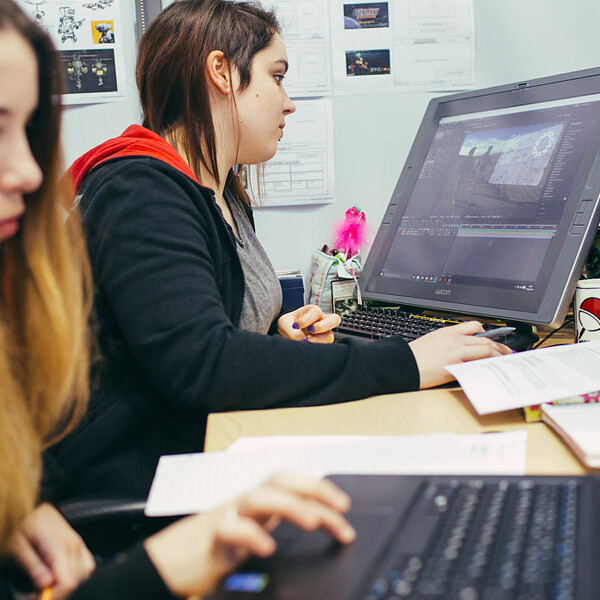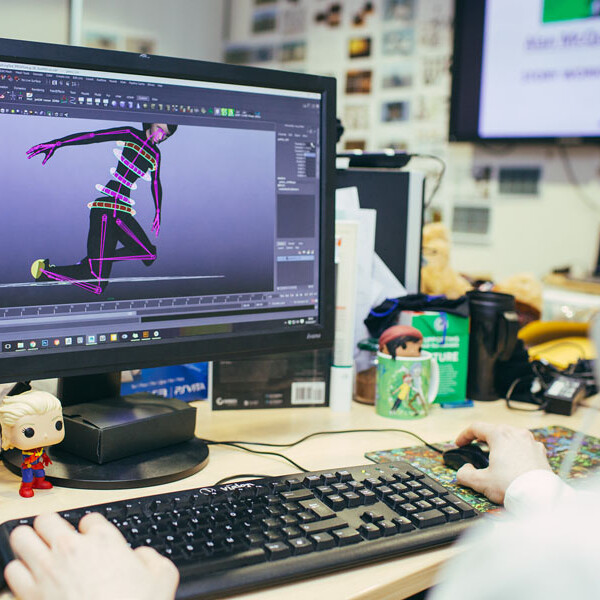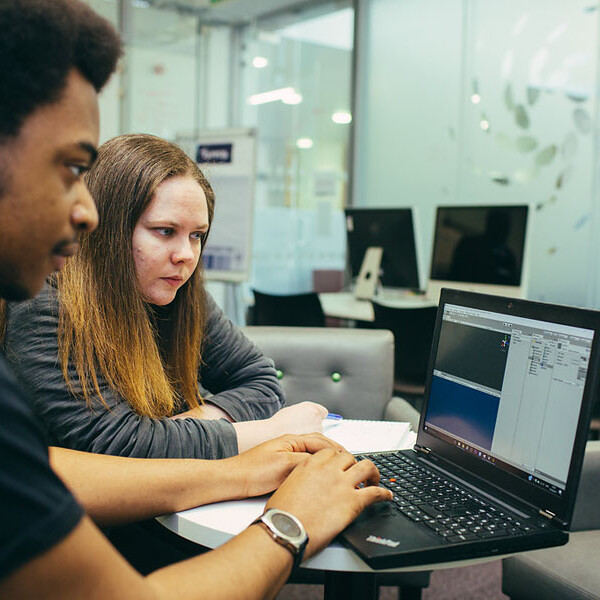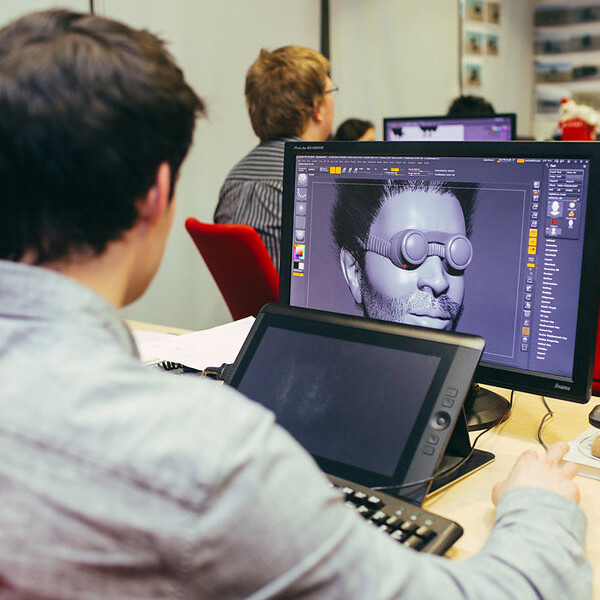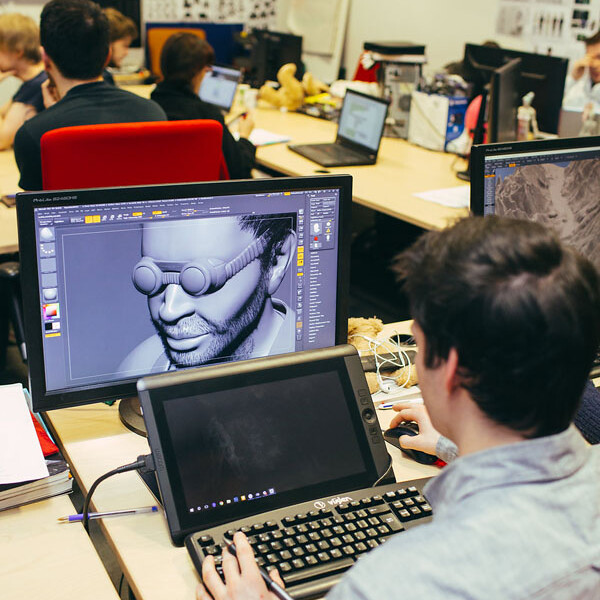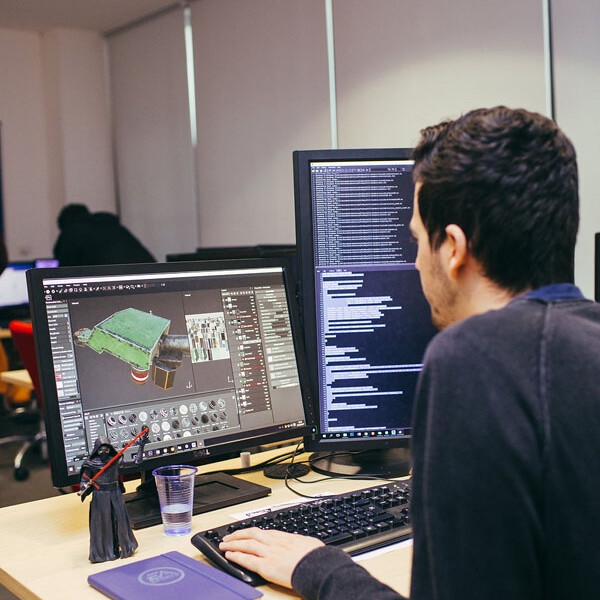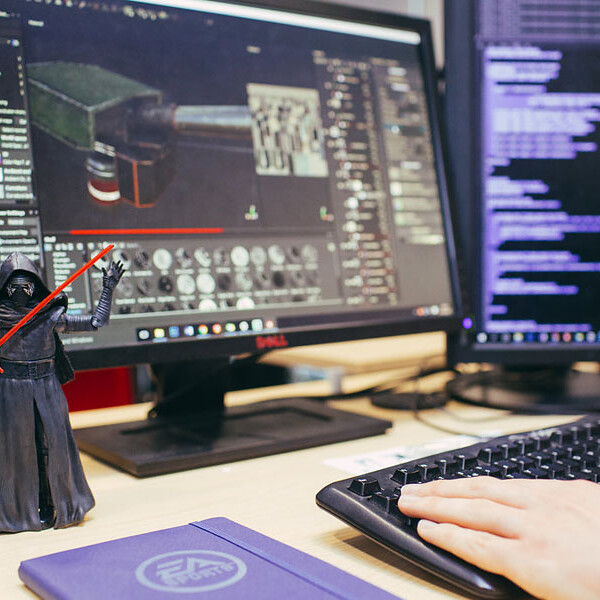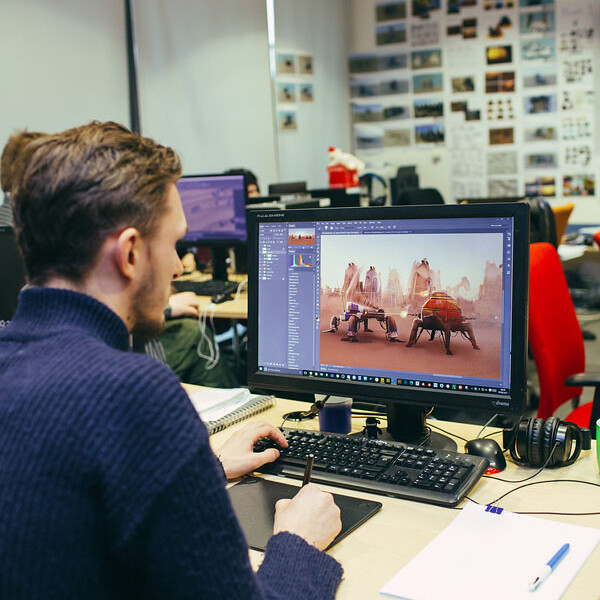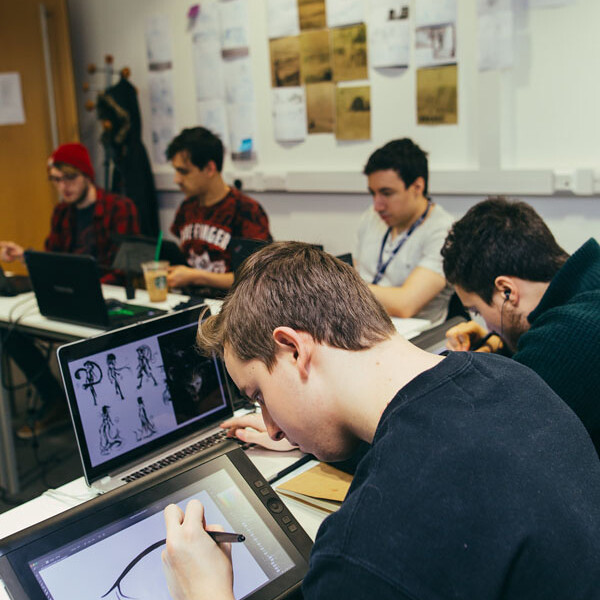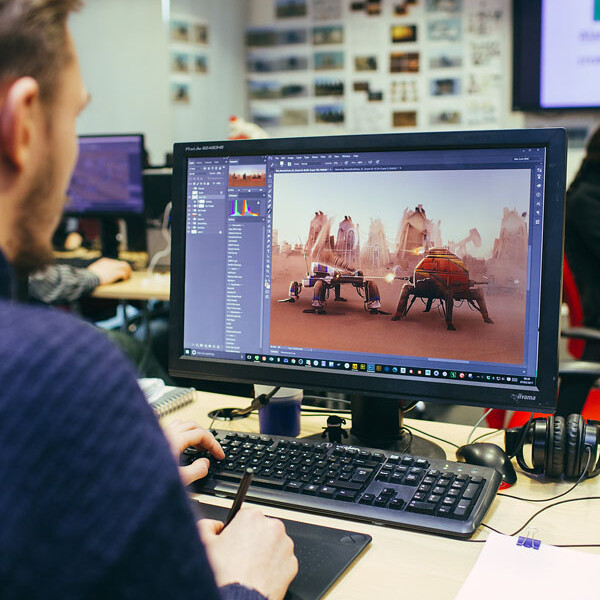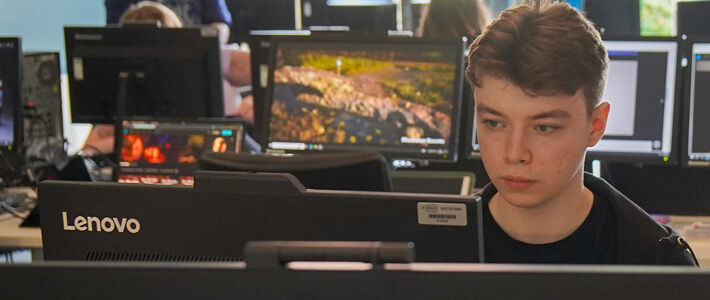
Digital Animation - BA (Hons)
Currently viewing course to start in 2025/26 Entry.
This cutting-edge BA programme will develop your skills across the Digital Animation practice conventions. You will be taught by established practitioners, who will provide their knowledge on 2D and 3D animation disciplines....
- Level Undergraduate
- Study mode Full Time
- Award BA (Hons)
- Start date September 2025
- Fees View course fees
- Subject
- Location City Centre
This course is:
Available with Professional Placement year
Open to International Students
Overview
This cutting-edge BA programme will develop your skills across the Digital Animation practice conventions. You will be taught by established practitioners, who will provide their knowledge on 2D and 3D animation disciplines.
The course is part of Birmingham City University’s Film suite, designed to develop graduates with knowledge of the theory, practice and industry trends that will enable them to succeed in a rapidly changing industry environment.
What's covered in this course?
The course will help you establish the core art fundamentals, such as anatomy, gesture, pose, weight distribution, perspective, composition and an understanding of how they underpin digital animation practice. You will also learn about the 12 principles of animation required to create engaging animation performance, whether you choose a Film/Television or Games/Interactive pathway. The course will introduce you to industry standard project management and pipelines methodologies that mirror industry production procedures.
Depending upon the route you choose to take on the course (Film/TV or Game/Interactive) you will produce a range of assessed material including but not exclusive to:
- Storyboards & story-reels
- Animation foundation exercises
- Performance animations
- Specialist portfolios and showreels
- Short films, made collaboratively, demonstrating animation principles and pipelines
- Game animation sets, demonstrated within the Unity and Unreal game engines
A key focus of this course is developing performance within character animation. You will develop acting techniques that will promote the development on your inner actor to project performance through your characters. You will also develop an understating of and demonstrate visual storytelling, with ‘show don’t tell’ philosophies.
While theoretical and practice-based considerations of animation techniques and principles remain a central focus to the award, the course also provides shared modules within film and games courses, offering wider collaborative opportunities which help provide core skills relevant to industry.
Professional Placement Year
This course offers an optional professional placement year. This allows you to spend a whole year with an employer, following successful completion of your second year, and is a great way to find out more about your chosen career. Some students even return to the same employers after completing their studies.
If you choose to pursue a placement year, you will need to find a suitable placement to complement your chosen area of study. You will be able to draw on the University’s extensive network of local, regional, and national employers, and the support of our Careers teams. If you are able to secure a placement, you can request to be transferred to the placement version of the course.
Please note that fees are payable during your placement year, equivalent to 20% of the total full-time course fee for that year.
This course is designed in response to the growing demand within the UK and International animation industries that require job ready graduates who can demonstrate within their showreels, animation foundation principles and skilled use of industry standard tools
Shaun Magher - Course Director, BA Digital Animation
Why Choose Us?
- In the vibrant context of the University’s Faculty of Arts, Design and Media, you’ll enjoy the benefits of outstanding resources, at the heart of a thriving creative community in our City Centre campus.
- You will be taught by tutors with over 30 years of experience within the UK and International Animation industries.
- The BA Digital Animation course is an employment-led programme, so your knowledge and skills will be up to date and relevant, making you industry ready upon graduation.
- Top 20 in the UK for student satisfaction for Computer Science (Complete University Guide 2025).
- We have a partnership with the BFI, which offers students free access to the BFI player.
Open Days
Join us for an Open Day where you'll be able to learn about this course in detail, chat to students, explore our campus and tour accommodation. Booking isn't open for this event yet, register your interest and we'll let you know as soon as booking goes live.
Next Open Day: 28 June 2025
Entry Requirements
These entry requirements apply for entry in 2025/26.
All required qualifications/grades must have been achieved and evidenced at the earliest opportunity after accepting an offer to help confirm admission and allow for on-time enrolment. This can also include other requirements, like a fee status form and relevant documents. Applicants can track their application and outstanding information requests through their BCU mySRS account.
Essential requirements
- Standard offer: 112 UCAS Tariff points. Learn more about UCAS Tariff points.
- Accelerate offer: 80 UCAS Tariff points. Find out more about BCU Accelerate.
Applicants will also need to submit a good portfolio.
If you have a qualification that is not listed, please contact us.
Fees & How to Apply
UK students
Annual and modular tuition fees shown are applicable to the first year of study. The University reserves the right to increase fees for subsequent years of study in line with increases in inflation (capped at 5%) or to reflect changes in Government funding policies or changes agreed by Parliament. View fees for continuing students.
Award: BA (Hons)
Starting: Sep 2025
- Mode
- Duration
- Fees
- Full Time
- 3 years
- £9,535 in 2025/26 ✱ Important note for this price
- Apply via UCAS
(↩Back to price) * The Government is proposing to increase the cap on full-time regulated tuition fees to £9,535 for 2025/26 and the University is planning on increasing fees to that maximum level once legislation is enacted. Part-time fees are charged pro-rata, where applicable.
International students
Annual and modular tuition fees shown are applicable to the first year of study. The University reserves the right to increase fees for subsequent years of study in line with increases in inflation (capped at 5%) or to reflect changes in Government funding policies or changes agreed by Parliament. View fees for continuing students.
Award: BA (Hons)
Starting: Sep 2025
- Mode
- Duration
- Fees
- Full Time
- 3 years
- £17,690 in 2025/26
Guidance for UK students
UK students applying for most undergraduate degree courses in the UK will need to apply through UCAS.
The Universities and Colleges Admissions Service (UCAS) is a UK organisation responsible for managing applications to university and college.
Applying through UCAS
- Register with UCAS
- Login to UCAS and complete your details
- Select your course and write a personal statement
- Get a reference
- Pay your application fee and submit your application
Guidance for International students
There are three ways to apply:
1) Direct to the University
You will need to complete our International Application Form and Equal Opportunities Form, and submit them together with scan copies of your original academic transcripts and certificates.
2) Through a country representative
Our in-country representatives can help you make your application and apply for a visa. They can also offer advice on travel, living in the UK and studying abroad.
3) Through UCAS
If you are applying for an undergraduate degree or a Higher National Diploma (HND), you can apply through the UK’s Universities and Colleges Admissions Service (UCAS).
You can request a printed form from your school or nearest British Council office. You will be charged for applying through UCAS. Birmingham City University’s UCAS code is B25 BCITY.
Portfolio guidance
If you receive an offer to study this course, you will be required to submit a portfolio. We ask that this is submitted within four weeks of receiving your offer.
Please see our portfolio guidance page for tips on putting your portfolio together.
Portfolio guidance
If you receive an offer to study this course, you will be required to submit a portfolio. We ask that this is submitted within four weeks of receiving your offer.
Please see our portfolio guidance page for tips on putting your portfolio together.
Personal statement
UK / EU students are required to submit a personal statement as part of their application for this course.*
The personal statement gives you a crucial opportunity to say why you’re applying and why the institution should accept you.
Here are the key areas you’ll need to address:
- Course choice - Why does this course appeal? What areas are of particular interest?
- Career plans - If you have a specific career in mind, say how your chosen course will help you pursue this goal.
- Work experience - Mention any work that is relevant to your subject, highlighting the skills and experience gained.
- School or college experience - Highlight skills gained at school/college, eg summer schools or mentoring activities.
- Non-accredited skills or achievement - eg Duke of Edinburgh Award, Young Enterprise scheme.
You should also mention your future plans – if you’re planning to take a year out, don't forget to give your reasons. Talk about any subjects you’re studying that don’t have a formal assessment and any sponsorships or placements you’ve applied for. And don't be scared to add in details about your social, sports or leisure interests.
Worried about Personal Statements?
If you've got no idea where to start or just want to check you're on the right track, we’ve got expert advice and real examples from our students to help you nail your personal statement. You can even download our ultimate personal statement guide for free.
*Non-EU students are not required to submit a personal statement when applying for this course.
Course in Depth
Year one
In order to complete this course you must successfully complete all the following CORE modules (totalling 120 credits):
The purpose of this module is to give you the opportunity to learn and then apply fundamental art techniques and methodologies. Students will work individually to produce a sketch book based upon a defined theme.
The work students will be given mirrors animation industry advice about art practice and will require an element of research and skill application.
You will learn how visual languages are applied and how to compose shots which are adaptable to other mediums such as animation. Students You will learn to storyboard professionally and to succinctly convey your ideas and visions to produce a short film.
You will be introduced to key animation principles, processes, and techniques in the creation of 2D digital animated sequences. You will explore the historical context and understanding of contemporary practices in animation, then apply this knowledge in developing ideas for their animated sequences.
The purpose of this module is to give you the opportunity to learn and then apply fundamental 3D modelling techniques and texturing methodologies. Students will work individually to produce a production ready asset.
You will be given an up-to-the-moment introduction to the working methodologies of 3D Animation production. This will allow you to experience the challenges of completing the research, development, and production of a 3D Animated short film.
Year two
In order to complete this course you must successfully complete all the following CORE modules (totalling 100 credits):
This module focuses on the development of characters to its final form. You will learn how various modes of storytelling, locations, events and music would influence your design decisions to create compelling concepts and believable characters. You are required to experiment and engage with different approaches to concept designs from sketches to 3 dimensional forms.
This module allows you to experience the challenge of completing the research and development of an animation ready character asset in either a 2D or 3D pathway.
The work you will create will mirror industry practice and require an extensive understanding of not only current technologies and methodologies.
This module introduces the principles of Acting for Animation, where students will learn how to project a performance into an otherwise, inanimate object. Character Animators at their core are Actors and students will be introduced to the practical methods of developing a performance from script through to final character animation, whether in a 2D or 3D pathway.
In order to complete this course you must successfully complete at least 20 credits from the following list of OPTIONAL modules.
The module is an opportunity to learn and critically reflect on the skills of collaboration by enabling you to create an interdisciplinary project with students from complementary disciplines, or with academic staff. Collaboration is a vital employability skill within the Creative Industries and this module allows you to develop these skills, making use of University facilities and with the support of academic staff. Within this module framework, several kinds of collaborative opportunities are available. For example, with the approval of your supervisor, you can determine a project based on your own interests; your supervisor may set you a predetermined project to enable you to work with other students in a way that is appropriate to your subject area; or there may be opportunities for you to collaborate with staff on research projects. In all cases, you must apply your subject skills to an interdisciplinary project which will be agreed in advance with your supervisor.
The purpose of this module is to enable you to develop professional attributes and subject skills through experience in the work place, and to critically reflect upon your learning in that context. You will normally be expected to arrange your own placement, with support from academic staff and ADM Careers+.
This module provides an opportunity for you to apply your knowledge and skills to an external, professional brief. The brief will be set by or in discussion with an external client/agency/community and could be a ‘real life’ problem to be solved, or a simulation. It is an opportunity for you to engage in a responsive, imaginative and professional manner with an aspect of your subject area, which contributes to the development of employability skills within the supportive infrastructure of the University.
Core modules are guaranteed to run. Optional modules will vary from year to year and the published list is indicative only.
Year three
In order to complete this course you must successfully complete all the following CORE modules (totalling 120 credits):
The purpose of this module is to give students the opportunity to learn and then apply fundamental animation techniques, methodologies and pipeline design for an animation production or development.
The module is an opportunity to learn and critically reflect on the skills of collaboration &/or your own professional practice. The module enables you to create either an interdisciplinary project with students from complementary disciplines or your own self-defined project.
The purpose of the module is to enable you to undertake a sustained, in-depth and theoretically informed research project exploring an area that is of personal interest to you. It is important that we can support you appropriately, so you will be guided towards choosing a research topic which is relevant to your discipline and in which your lecturers have expertise. The outcome may take the form of a written dissertation or a practice-based portfolio.
Download course specification
Download nowYou will learn through a series of lectures, seminars and practice-based workshops, as well as gaining valuable collaborative skills within Animation production.
Year One
In the first year of study, you will develop your skills within core Art and Animation principles.
You will receive intensive training in industry standard 2D and 3D digital Art and Animation tools.
You will experience working collaboratively to make short films and establish practical and theoretical skills within Digital Animation production.
Year Two
In the second year of study, you will develop your practical skills and knowledge within Character development. From Concept, through to animation ready character creation.
You will begin to explore your chosen specialisms, in 2D or 3D Animation production, either within a Film/TV or Games pathway.
You will have the option to collaborate with wider GFA and BICA courses, to make short films or to participate in Game jams.
You will develop your skills within acting for animation, where you will learn to capture and project performance within your animation.
Year Three
Our Professional Practice modules will help you develop and consolidate your theory and practice within Animation, enabling you to create a body of work that demonstrates the quality of work required to enter the Animation industry and start your future career.
Employability
You will learn of range of skills which will be key to enhancing your future employability.
Specifically, you will learn to:
- Develop your own practice within a professional context that would enable future employment options in the Animation industry.
- Identify the relationship of theory to practice and effectively demonstrating it through your work.
- Produce animation shorts, effective animation pipeline to a professional standard.
- Work independently and collaboratively.
- Be a self-motivated, organised and independent effective learner.
- Be confident in showcasing your work for critique and highly reflective of your processes.
You will also learn skills in a range of workshop practices in relation to individual development, including but not limiting to the use of camera and photography, 3D printing, motion capture, sculpting and life drawing.
Professional practice guidance will teach you a range of skills such as CV writing; portfolio development, editing showreels , use of social media and other platforms for self-promotion, presenting yourself and your work in a professional framework.
Placements
You will have the option of an international exchange, and the opportunity to get involved in a range of live projects. Placements are not part of the curriculum but are encouraged and supported by staff should an opportunity arise.
In such an example, our students have worked closely with Flatpack Festival in programming some of the events, organised and ran animation workshops and volunteering throughout the festival.
Graduates and students were also involved in the production of a Rube Goldberg animation for Second Home Studios which subsequently won the RTS Best Production Craft Skills award.
Students have also participated in Animation Festival submissions such as Annecy, Encounters, New Designers, and the prestigious Royal Television Society Awards amongst others.
Students have been wining RTS Awards dating back to 1997 with more than a dozen winners and nominees.
The Jury Distinction was also awarded to one of our graduates for his outstanding Animation at Annecy Animation Festival which was of the highest accolade.
Facilities & Staff
You will have access to first class studio facilities such as the Green Screen Studio, BOLT JR+ high-speed camera robot, Motion Capture Suit and VR systems. The studios are set up in a conducive working environment with support from technicians and operators.
To support your learning, PCs and Macs are available across the campuses. Wacom tablets and Cintiqs are supplied to facilitate digital drawing and sculpting. Computers are equipped with the latest Adobe Suite and Autodesk software. Specialist animation software(s) are usually installed in dedicated computers for Digital Animators.
Professional digital cameras, lighting and recording equipment are also available in the Hires and Loans store.
Our staff
Shaun Magher
Course Director BA (Hons) Digital Animation, MA Feature Film Development
Shaun has spent 30 years working as a Director, Creative Director and Animation Director within the UK and International Film and Television industries. A graduate from St Martins school of Art (1985) and the National Film and Television school (1989).
More about ShaunKelvin Wong
Animation Lecturer
Kelvin has over 14 years’ experience in animation, visualisation and education, and supports both home and international franchises in Hong Kong and Thailand, respectively. Kelvin has a keen interest toward new technologies, including CGI, projection mapping and the application of 3D printing.
More about Kelvin

